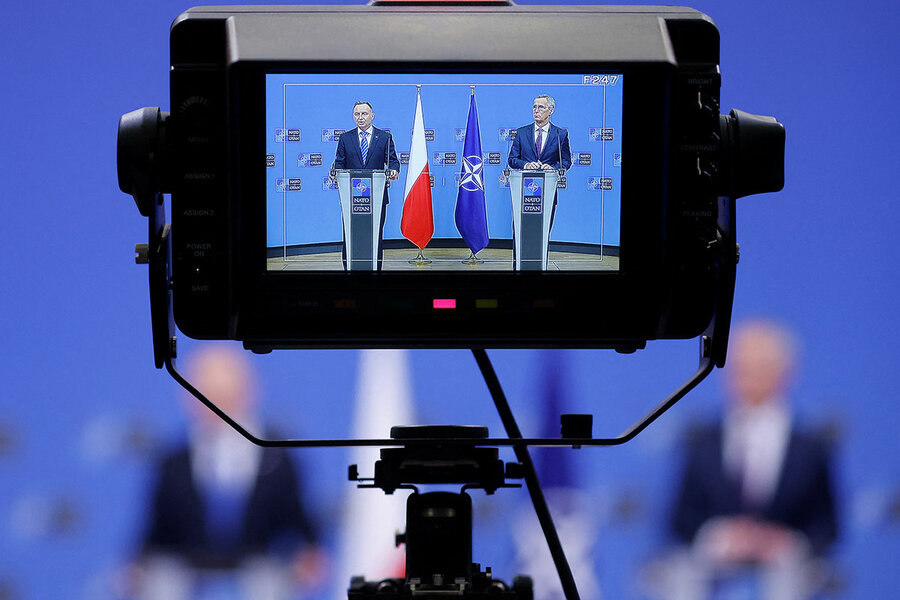Ukraine war pulls NATO center of gravity eastward
| London
Like a gusting easterly, Vladimir Putin’s assault on Ukraine has buffeted America and its European allies into huddling more closely together than at any time since the 9/11 terror attacks two decades ago.
Yet the Ukraine war hasn’t just reinforced the trans-Atlantic alliance.
It has been changing it, dramatically.
And while the endpoint of this process isn’t yet clear, the way in which it plays out in the months ahead will have a decisive impact on the war, on the level of Western military support for Ukraine, and the shape of any diplomatic resolution, if and when that comes.
One thing is clear: the U.S.-Europe partnership looks unrecognizably different than before the invasion. And that change will be underscored next week, a year after Mr. Putin unleashed his military in a bid to crush and swallow up Ukraine.
U.S. President Joe Biden will mark that grim anniversary in Europe. But he’ll do so not in Paris, Berlin, London, or Brussels, allied capitals that White House aides would have chosen to keynote a European visit before the Ukraine war.
He will be in Warsaw, alongside the president of Poland, Ukraine’s neighbor and now an increasingly important member of NATO.
On both sides of the Atlantic, that would have been almost unimaginable a year ago – and not just because Polish President Andrzej Duda, like his fellow “illiberal democrat” Viktor Orbán in Hungary, was a full-throated cheerleader for Mr. Biden’s predecessor, Donald Trump.
It’s because before Mr. Putin attacked Ukraine, the United States had seemed in trans-Atlantic retreat. Even under a new president, Washington was less focused on its European allies – whom it blindsided with its sudden and chaotic retreat from Afghanistan – than on its rivalry with China.
Europe, too, was in a period of flux, introspection, and uncertainty.
Germany’s chancellor, Angela Merkel, Europe’s elder statesperson, had left the scene, giving way to a coalition under the untested Olaf Scholz. Britain had abandoned decadeslong membership in the European Union and was struggling to figure out how to deliver on the lofty promises of Brexit.
French President Emmanuel Macron, widely viewed as the natural heir to Ms. Merkel, did have a coherent vision, but it was of a more united Europe asserting “strategic autonomy” from Washington, not a closer alliance.
Then Mr. Putin provoked Europe’s deadliest conflict since World War II.
America is now reengaged, as the trans-Atlantic alliance’s indispensable senior partner. It is Washington that has brought the allies together with a unity and effectiveness that very few outside leaders – Mr. Putin surely not among them – would have believed possible.
And while a number of NATO allies have come up with military and financial backing for Ukraine, the United States has been providing by far the lion’s share.
The geopolitics of Europe, too, have changed.
Both France and Germany have given military assistance, including, most recently, tanks and armored vehicles. But they have done so with evident reluctance. In the early months of the war, both Paris and Berlin held out hope of providing some kind of diplomatic exit ramp for Mr. Putin that might bring the fighting to a halt.
Washington’s most reliable shoulder-to-shoulder partners have been on Europe’s eastern flank – Poland and other former Soviet bloc states such as the Baltic countries of Lithuania, Latvia, and Estonia, as well as formerly neutral Finland and Sweden, which have chosen to join NATO.
And an unlikely stalwart in Western Europe as well.
Britain has responded with forceful, at times nearly Churchillian, support for Ukrainian President Volodymyr Zelenskyy. Its own early decision to provide artillery, missiles, and tanks helped prod fellow Western Europeans, especially Germany, to offer more military support themselves.
But while this newly reconfigured alliance has proved staunch so far, it remains a geopolitical work in progress.
Its unity of commitment would be tested particularly if Ukraine’s forces struggled to push back Russia’s expected major new offensive.
The former Soviet bloc states are sure to hold firm. Ever since Mr. Putin’s initial attack on Ukraine in 2014, and his annexation of Crimea, they had been urging both Europe and the United States to take the threat of further Russian aggression more seriously.
And Britain, with uncommon cross-party support, seems resolute in insisting that Mr. Putin must be denied any semblance of victory.
But Russian advances on the ground – or even an increasingly brutal stalemate – might lead other key allies, like Germany and France, to dial back military support and seek a path to negotiations instead.
Washington will hold the key. Mr. Biden has vowed to back Ukraine for “as long as it takes.” But the recent midterm elections handed control of the House of Representatives to the Republicans, and a few members of Congress have begun to question the scale of arms and aid packages.
After the downing of a Chinese surveillance balloon earlier this month, they may seek to make a broader argument: that it’s time to turn America’s attention away from Europe and back to China.






